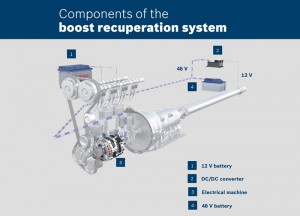The new Bosch boost recuperation system (BRS) is set to close the persistent and sizeable gap between start-stop systems and hybrid drives.
Wolf-Henning Scheider, member of the board of management of Robert Bosch GmbH said,
“BRS represents the affordable electrification of compact cars. We are serving the needs of the mid-price segment by providing tailored components such as a lithium-ion battery with a capacity of 0.25 kilowatt hours.”
BRS can lower a vehicle’s fuel consumption and CO2emissions by up to 15 percent thanks to electrical components that provide the engine with up to ten kilowatts of additional power. This opens up another way to meet more demanding CO2 emissions restrictions in Europe, China, and the United States.
This innovative Bosch drive component combines four functions within one system: recuperation and torque boost together with comfortable start-stop and coasting functions. The centerpiece of this new hybridization is a highly efficient generator that has been upgraded from 12 to 48 volts using new power electronics, making the electric motor up to four times more powerful than before.
This 48-volt electrical system offers drivers a range of benefits. Increasing the voltage allows vehicles to be fitted with new comfort and security systems. And as mechanics do not need special high-voltage training before they can service BRS, it is easier to maintain than current hybrid systems.
BRS charges during braking and delivers additional torque when accelerating
As its name suggests, the boost recuperation system performs two main functions: it uses recuperation to recover energy and then uses that energy for vehicle acceleration. In detail, it works as follows: any surplus energy from braking is sent via the 48-volt vehicle electrical system to the 0.25 kilowatt-hour lithium-ion battery. When required, this energy is fed back to the BRS, which then functions as an electric motor. This means BRS provides additional torque – a boost effect that is particularly important for achieving dynamic handling with small, turbocharged engines and at low engine speeds.
The new system also expands the familiar start-stop system to enable coasting. If neither the accelerator nor brake pedal is depressed while coasting to a stop or going slightly downhill, BRS automatically stops the internal combustion engine. The vehicle coasts along driven solely by its momentum, producing no emissions and no noise. Freeways and highways that slope gently downward provide ideal driving conditions for BRS coasting. Under real conditions such routes offer the chance to coast for 30 percent of the journey.
The comfort of a start-stop function and silent starting
The boost recuperation system also takes the start-stop function to the next level by rapidly starting the vehicle’s engine with no noise or jolts, even when restarting the combustion engine during coasting. Once again, the 48 volt battery helps by reliably bridging these driveless periods to provide power to all comfort and safety functions.
New vehicle electrical system architecture with DC/DC converter
With its additional functions, the 48-volt electrical system is a particularly attractive solution for midsize and luxury vehicles, as it permits electrification of vehicle functions that could not be supported by a system with lower voltage and energy. It can, for example, increase the functionality and reduce the CO2 emissions of air-conditioning compressors, turbochargers, engine-cooling fans, and auxiliary heaters. A bidirectional DC/DC converter – known as the power conversion unit, or PCU for short – connects the new 48 volt electrical subsystem to the conventional 12-volt system with a high degree of efficiency and reliability. The PCU’s main job is to supply this 12 volt electrical system with electrical energy produced and stored on the 48 volt part of the system. The PCU is compact and can be flexibly installed in the vehicle, even the engine compartment.

Source; Bosch
